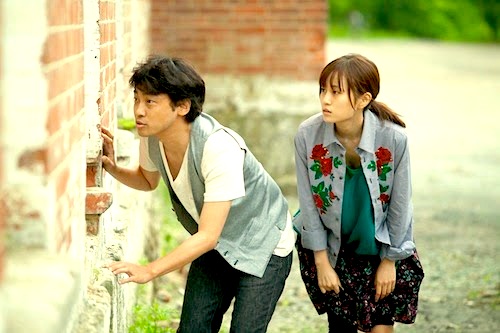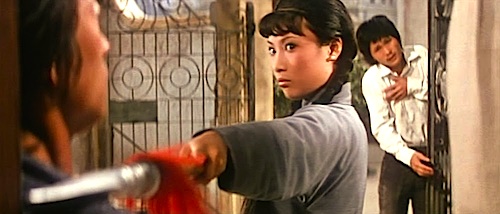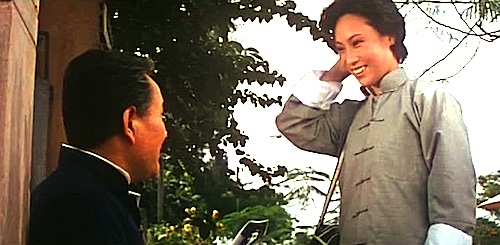By Joe Bendel. Romantic clichés require two to tango, but that is usually not a problem in the movies. Instead, rom-com tropes are dashed upon the rocks of genre cinema in a new long short and a short feature by Japanese J-horror auteur turned art-house favorite, Kiyoshi Kurosawa. Sure to have a long shelf life on the international festival circuit, Kurosawa’s Beautiful New Bay Area Project and Seventh Code played as a double bill during the 2014 New York Asian Film Festival.
Prepare yourself for a look at the seedy side of urban redevelopment in Bay Area (originally conceived as part of a themed anthology). Amano’s family has always ruled the Yokohama port and continues to do so, even though he is a mere wastrel, figurehead president of the family development business. They have ambitious plans to transform the waterfront, but he is more interested Takako, a beautiful laborer. Evidently, he has dreamed of her, but this means nothing to her.
Frankly, it is not exactly clear who or what she is, but she takes her work as a longshoreman and her father’s name very seriously. Enraged by her rejection, Amano steals her ID tile and instructs security to forcibly remove her should she come to reclaim it. That she does—far stronger than anyone expects.
In all honesty, the story of Bay Area does not make much sense and it looks like it was filmed with the cheapest digital camera available at Wal-Mart (not to mention grossly violating the principle of Chekhov’s gun, or rather Chekhov’s norovirus), but it is an awful lot of fun when Takako starts taking care of business. Kurosawa considers this his twenty-nine minute foray into action filmmaking and he duly delivers a series of fan pleasing fight sequences. Tasuku Emoto might not be much as Amano, but Mao Mita is likely to become a lot of NYAFF patrons’ new movie crush as the lovely and steely Takako.
At first blush, Akiko seems to have little in common with Takako. She is the ostensibly innocent protagonist of the hour-long Seventh Code, who has followed the mysterious Matsunaga to Vladivostok, because she was deeply taken with him during a chance meeting in Japan. Hardly knowing her, Matsunaga encourages her to return home, but when she persists, his dodgy Russian associates steal her luggage and passport, leaving her in the middle of nowhere.
However, it will take more than that to get Akiko to give up. Eventually, she will find limited work and friendship with an expatriate Japanese restauranteur and his Chinese girlfriend, Hsiao-yen, while continuing her search for Matsunaga. Yet, now and then, Kurosawa drops hints there might be more to this story than meets the eye.

In contrast to Bay Area, Code looks fantastic. Kurosawa effectively takes viewers on a walking tour of Vladivostok’s back alleys, giving the audience a vivid rough-and-tumble sense of place. He also stages another first-rate fight scene and maintains a general vibe of weirdness. While the big surprise might be easy to anticipate, Japanese pop star Atsuko Maeda turns it quite agilely as Akiko. It is a nice acting debut vehicle for her, even though Chinese television host Aissy steals a number of scenes outright as the ambiguously ambitious Hsiao-yen. Unfortunately, Kurosawa has a hard time wrapping-up Code, tacking on a number of false endings and a completely random performance from Maeda, perhaps intended to satisfy her fans.
While both films are a bit of a mixed bag, they are brimming with energy and spectacularly showcase the talents of Mita, Maeda, and Aissy. They fit well together, but represent another curve ball for cineastes familiar either with his previous genre work, like Pulse, or his more sensitive recent releases, such as REAL or Tokyo Sonata. Recommended for fans of action and espionage films with resourceful leading ladies, Beautiful New Bay Area Project and Seventh Code screened this week at NYAFF, so expect them to pop up at more fests shortly.
SEVENTH CODE : LFM GRADE: B+
BEAUTIFUL NEW BAY AREA PROJECT: LFM GRADE: B-
Posted on July 9th, 2014 at 12:00am.

